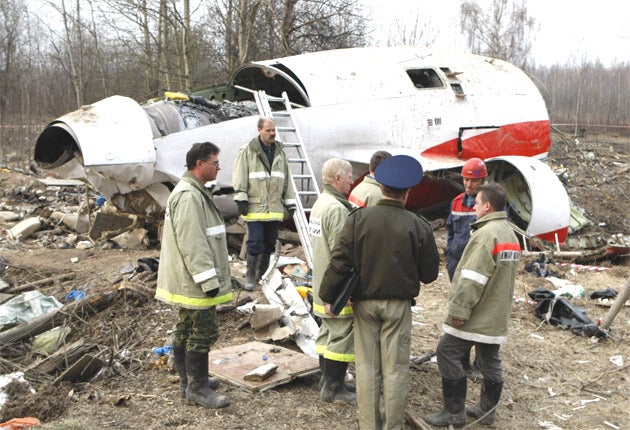Passengers 'were in cockpit before Polish plane crash'

Before the Polish President Lech Kaczynski's plane crashed, at least two passengers visited the cockpit, others may have chatted on mobile phones that can obstruct navigation instruments and an under-trained crew faced heavy fog over challenging terrain.
Those were among the details revealed yesterday by Russian and Polish officials investigating the crash on 10 April that killed the president, his wife and 94 others outside the western Russian city of Smolensk. The preliminary report drew no conclusions about what caused the catastrophe.
The crash had deep diplomatic resonance given the long-troubled relations between Russia and Poland, and releasing an incomplete report may have been intended by both sides to show their determination to be candid and co-operative.
Alexei Morozov, head of the technical commission of Russia's Interstate Aviation Committee, also told reporters that among the questions that needed further investigation was whether the rolling terrain around the Smolensk military airport distorted instrument readings. The plane went down in a ravine about 15 metres below the level of the runway less than a mile away. "The presence of this ravine can have a natural influence on the readings of the radio altimeter," he said. "This is one of the subjects the technical commission is working on."
He also said the commission was probing whether the use of mobile phones aboard the Tupolev Tu-154 affected its navigation.
The most tantalising, though inconclusive, detail was that two voices not belonging to crew members showed up on cockpit flight recorders. Officials said it was not clear who one of the voices belonged to, declined to identify the other and did not report what either person said. But the information could feed persistent speculation in Poland that Mr Kaczynski or someone in his entourage pressured the crew to land despite visibility that had shrunk to about 200 metres.
The plane was carrying top political figures on their way to attend a memorial for thousands of Polish officers who were killed by Soviet secret police in 1940. Changing course would have severely delayed the delegation from getting to the ceremony.
Edmund Klich, Poland's envoy to the investigation, said only that "certain suggestions" were made by the passengers that he believed had no influence on the plane's fate, though admitted he had not heard the recordings. The voices were heard no later than 16 minutes before the crash.
Poland's PAP agency said it had learned from a source close to the investigation in Moscow that one of the two voices in the cockpit that did not belong to a crew member was that of the Air Force Commander, General Andrzej Blasik.
Mr Morozov also said the Polish air force crew had been assembled only a few days before the flight and that they had not been receiving regular training that could have helped them cope with unusual conditions.
About five seconds before the plane hit a tree in the ravine, the captain switched off the autopilot and started to bank around for a second landing attempt. An automated voice warned "pull up" about 18 seconds before the crash, and before that the crew twice heard the phrase "terrain ahead".
Join our commenting forum
Join thought-provoking conversations, follow other Independent readers and see their replies
Comments
Bookmark popover
Removed from bookmarks